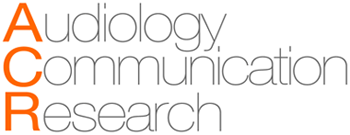ABSTRACT
Purpose
To determine the relationships between auditory-perceptual and self-assessment measures in patients with multiple sclerosis with and without vocal complaints.
Methods
Eighteen subjects diagnosed with multiple sclerosis, including 12 women and 6 men aged between 21 to 67 years, participated in the study. A brief anamnesis, the Voice Symptom Scale and the Living with Dysarthria questionnaire were completed, followed by recording of the sustained /ԑ/ vowel. The overall severity of vocal deviation and the degrees of roughness, breathiness, strain and instability were assessed by three speech therapists using a 100-mm visual analogue scale.
Results
Patients with multiple sclerosis and vocal complaints had higher Total (p= 0.026) and Limitation (p= 0.042) scores on the Voice Symptom Scale and on sections one (p= 0.041), four (p= 0.030) and ten (p= 0.050) of the Living with Dysarthria questionnaire. Strong positive correlations were found between the Total and Limitation scores of the Voice Symptom Scale and the scores of sections one, four and nine of the Living with Dysarthria questionnaire.
Conclusion
Patients with multiple sclerosis and vocal complaints have higher frequencies of symptom occurrence and emotional and speech effects. No relationship was found between auditory-perceptual and self-assessment measures in patients with multiple sclerosis. However, the scores on the two self-assessment instruments used are strongly correlated.
Keywords:
Multiplus sclerosis; Voice; Voice quality; Voice disorder; Self-assessment
